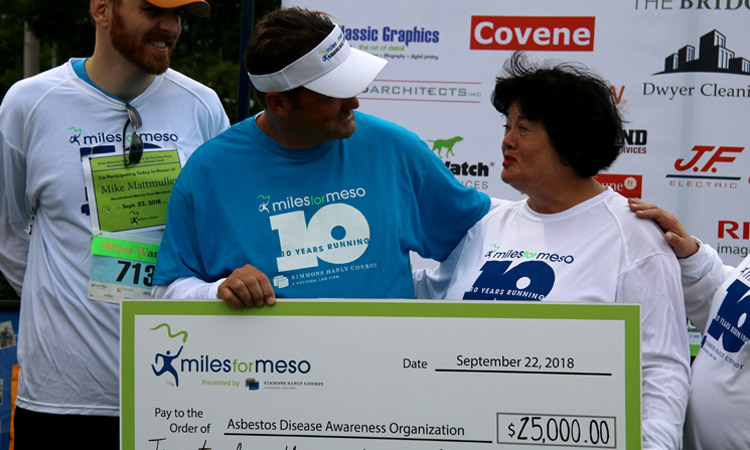
Seven years ago, after an extrapleural pneumonectomy, Mike Mattmuller got the news most other mesothelioma patients will never hear: his cancer was in remission. Yet he wasn’t ready to relax. His recovery only gave him fresh determination to protect others from asbestos, the dangerous mineral that causes 3,000 new mesothelioma cases every year.
So, he and his wife Jessica started volunteering for the Asbestos Disease Awareness Organization (ADAO), work for which they were recently awarded the Alan Reinstein Award. Every year, for Mesothelioma Awareness Day (part of Mesothelioma Awareness Month), Mattmuller would attend ADAO’s Congressional Staff Briefings to tell his remarkable story of survival.
This year, however, he’s headed to Washington to tell a different story. Like 93 percent of others who undergo an extrapleural pneumonectomy, Mattmuller’s mesothelioma reoccurred. He finds himself once again back in the ring, fighting the cancer that began seven years ago. For him, this year’s Mesothelioma Awareness Day is about underscoring the difficulty of dealing with asbestos exposure – and more than ever, the Environmental Protection Agency’s failure to protect us from it.
ADAO ‘Strongly Criticizes EPA’ for Not Taking Action
In April 2017, the EPA’s Office of Inspector General (which oversees the agency independently) began an audit of the EPA’s enforcement of the Asbestos Hazard Emergency Response Act (AHERA). The law, passed in 1986, requires the EPA to inspect schools for asbestos exposure.
The results of the audit have now been released. Unfortunately, the report details failing after failing of the EPA to properly monitor and manage asbestos in schools.
Nearly 40,000 Americans die from asbestos exposure every year. According to the OIG’s report, children are at a higher risk for asbestos exposure “because they are more active, breathe at higher rates and through the mouth and spend more time closer to the floor where asbestos fibers can accumulate.” Yet the EPA missed several critical opportunities to remove asbestos from schools and only performed 13 percent of AHERA-required inspections. State asbestos abatement programs performed 87 percent.
In response to these findings, the EPA said it lacked the resources for asbestos risk evaluation and has deprioritized it for other non-asbestos-related activities. Experts say this doesn’t hold water considering states are doing much more than federal government.
“It is reprehensible that the EPA has ignored asbestos in schools and disinvested in AHERA, exposing children and teachers to this deadly substance,” said ADAO President and CEO Linda Reinstein. “This report is another example supporting the need for the EPA to ban asbestos and end the man-made disaster.”
Reinstein notes that the EPA’s “reckless” management of AHERA and TSCA has only deteriorated under Trump. Since the administration proposed slashing 20 percent of the agency’s workforce earlier this year, the EPA further limited the scope of asbestos evaluation under the already-weakened TSCA to the point of ignoring risks in schools. Clearly, Mesothelioma Awareness Day couldn’t have come at a better time.
“The EPA has failed Americans, again,” she said. “It’s time for Congress to keep our students and school staff safe by enforcing AHERA and banning asbestos now.”
ADAO to Step in
As the largest U.S. nonprofit dedicated to preventing asbestos exposure, ADAO will play a major role in holding the EPA accountable this week.
The organization has already been hard at work this month, collecting hundreds of action cards signed by participants of Miles for Meso races in Illinois and Ohio urging the EPA to ban asbestos once and for all without any loopholes.
Today, at the ADAO’s 13th Annual Congressional Staff Briefing entitled “TSCA and Asbestos: EPA’s Failure to Protect Public Health,” Reinstein and Mattmuller will share their stories and enter those cards into the record.
ADAO is now urging the public to join the effort. You can participate by:
- Signing and sharing ADAO’s Ban Asbestos Now petition.
- Joining the conversation online – either on ADAO’s website, with your social networks using the hashtags #BanAsbestosNow or #EndMeso, or during ADAO’s #EndMeso Twitter Chat from 12:00 – 1:00 pm ET.
- Donating to ADAO to support its education, advocacy and community support programs.
Remember, your voice makes an important difference. Only together can we advocate for better EPA leadership and a safer country for the next generation.
“Turning a blind eye to the risks to children from asbestos at school is tantamount to installing cigarette machines in the hallways,” said EWG President Ken Cook. “Congress should not confirm Alexandra Dunn to head EPA’s chemical safety office unless she commits to follow the law and help schools tackle this serious health threat facing an untold number of children.”
